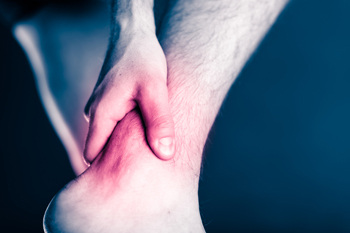An Achilles tendon rupture occurs when the tendon, located at the back of the calves, tears completely due to physical activities. Anyone can rupture their Achilles tendon. Ruptures can occur suddenly and without warning, especially in people who participate in sports like basketball or tennis, which involve a lot of sprinting or pushing off. But even if you might not be able to predict an Achilles tendon rupture based on pain prior to the injury, there are certain people who are more at risk than others. People who are older, have poor flexibility, lead an inactive lifestyle, take steroid medications or certain antibiotics, and those who have diabetes, gout, rheumatoid arthritis, or kidney disease are most at risk. Another group that may have to deal with an Achilles tendon rupture are “weekend warriors.” These are people who participate in sports or other exercise only occasionally. Achilles tendon ruptures are characterized by the abrupt onset of pain akin to being kicked in the back of the leg, hearing or feeling a pop at the time of injury, and weakness, bruising, or swelling of the affected leg. If these symptoms sound familiar to you, please seek the care of a podiatrist.
Achilles tendon injuries need immediate attention to avoid future complications. If you have any concerns, contact one of our podiatrists of Florida Foot & Ankle Group, P.A.. Our doctors can provide the care you need to keep you pain-free and on your feet.
What Is the Achilles Tendon?
The Achilles tendon is a tendon that connects the lower leg muscles and calf to the heel of the foot. It is the strongest tendon in the human body and is essential for making movement possible. Because this tendon is such an integral part of the body, any injuries to it can create immense difficulties and should immediately be presented to a doctor.
What Are the Symptoms of an Achilles Tendon Injury?
There are various types of injuries that can affect the Achilles tendon. The two most common injuries are Achilles tendinitis and ruptures of the tendon.
Achilles Tendinitis Symptoms
- Inflammation
- Dull to severe pain
- Increased blood flow to the tendon
- Thickening of the tendon
Rupture Symptoms
- Extreme pain and swelling in the foot
- Total immobility
Treatment and Prevention
Achilles tendon injuries are diagnosed by a thorough physical evaluation, which can include an MRI. Treatment involves rest, physical therapy, and in some cases, surgery. However, various preventative measures can be taken to avoid these injuries, such as:
- Thorough stretching of the tendon before and after exercise
- Strengthening exercises like calf raises, squats, leg curls, leg extensions, leg raises, lunges, and leg presses
If you have any questions please feel free to contact one of our offices located in Debary, Lake Mary, Orlando, and Oviedo, FL . We offer the newest diagnostic tools and technology to treat your foot and ankle needs.

